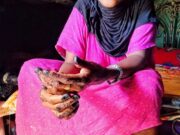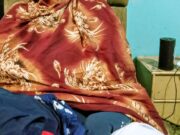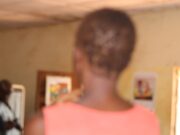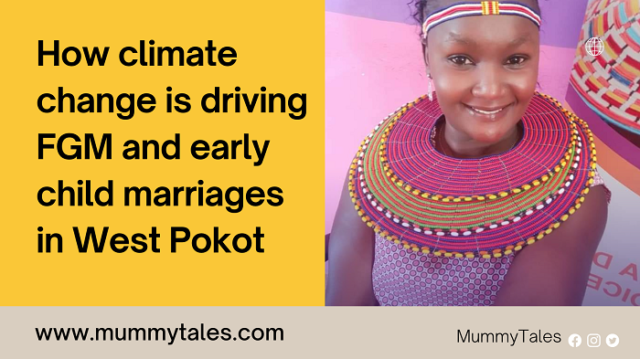By Maryanne W. Waweru l maryanne@mummytales.com
One day, as Domtila Chesang was returning from her anti-FGM campaign activities in the remote village of Kotulpogh in Masol ward, West Pokot County in northwest Kenya, she spotted two young girls animatedly flagging down their vehicles. With darkness fast approaching, and it being a bandit prone area that is highly volatile, a worried Domtila, who was traveling in a convoy of two vehicles stopped.
“The girls said they were running away from their village and pleaded that we take them along with us. They were familiar with our work and knew we had visited their village that day and taken some young girls with us. Their parents had allowed us to enroll them in boarding school,” Domitila remembers.
Unable to leave the girls alone in the risky area, Domtila invited them to their vehicle. This incident would lead to one of the most heartbreaking moments in Domtila’s work as an anti-FGM crusader.
For the last nine years, Domtila has been tirelessly creating awareness about the harmful effects of female genital mutilation (FGM) or cutting, a harmful cultural practice that is deeply ingrained and widely practiced in West Pokot. FGM comprises all procedures that involve altering or injuring the female genitalia for non-medical reasons. The genitalia is cut with a razor blade or knife, oftentimes with no anesthesia or disinfectant.
Harmful effects of FGM
FGM has no health benefits and has serious implications for the sexual and reproductive health of girls and women. The UNPFA states that FGM’s immediate complications include severe pain, shock, haemorrhage, tetanus or infection, urine retention, ulceration of the genital region and injury to adjacent tissue, wound infection, urinary infection, fever, and septicemia. Some of these complications can be fatal. Long-term consequences include childbirth complications, anaemia, cysts and abscesses, keloid scars, damage to the urethra resulting in urinary incontinence, painful sexual intercourse, sexual dysfunction, hypersensitivity of the genital area and increased risk of HIV transmission, as well as psychological effects.
Outlawed in Kenya
FGM is regarded as a serious human rights violation for girls and women and towards this, Kenya has ratified several international and regional legal instruments that have become part of the Kenyan law as provided for in Article 2 of the Constitution. These include The Universal Declaration on Human Rights (UDHR, 1948), The Convention on the Elimination of All Forms of Discrimination against Women (CEDAW 1979), the United Nations Convention on the Rights of the Child (UNCRC, 1989) and the Protocol to the African Charter on Human and People’s Rights on the Rights of Women in Africa (Maputo Protocol, 2003).
Kenya’s Constitution affirms the government’s commitment to protect and promote all human rights and fundamental freedoms, including those of girls and women. The Prohibition of Female Genital Mutilation Act (2011) states that it is illegal to practice FGM in Kenya, or to take someone abroad for the same. The Children’s Act, 2001 criminalizes subjecting a child to harmful cultural practices, while Chapter 63 of The Penal Code outlines offences under which circumcisers can be charged. Additionally, the Protection against Domestic Violence Act, 2015 classifies FGM as violence.
High FGM prevalence
Despite it being forbidden, FGM is still practiced in the country, varying across regions and ethnic communities. According to the Kenya Demographic and Health Survey (KDHS 2014), the national FGM prevalence rate is 21%. FGM mostly happens during the July – August and November – December school holiday seasons, where thousands of girls aged between 9 – 15 are circumcised. In many of these communities, FGM is a critical rite of passage and a pre-requisite for marriage.
In West Pokot, the prevalence rate is 74%, according to UNICEF. In this county, the prevalence rates are particularly high in Central Pokot, North Pokot, and parts of South and West Pokot sub-counties.
Domtila’s anti-FGM efforts in West Pokot through her organization I-Rep Foundation, in collaboration with those of other partners in both the public and private sector have led to significant strides over the years. Some families have abandoned the practice and sent their girls to school. At these learning institutions, the girls do not only receive an education but are sheltered from circumcision and marriage.
One of Domtila’s partners is her former boarding primary school. When she herself was young and living in fear of being circumcised and married off, it was this school that sheltered her. Domtila now spends time in her community encouraging parents and elders to educate their girls. Some allow her to take their daughters and enroll them in the school. That is the mission Domtila had undertaken on the day the two girls animatedly stopped their convoy.
Chebichii and her friend
The girls who had stopped Domtila’s convoy were both aged 14. They were ripe for marriage. Among the Pokot, a girl of good standing is one who has been circumcised. It gives her privilege in society. It is an integral aspect of womanhood. An uncut girl is shamed, ridiculed, condemned, and excluded from group peer activities.
Of the two girls, one had already been circumcised and was soon to be married off to an old man. The other girl, Chebichii*, was scheduled for circumcision the following month, after which she would be married off. Their fate had already been sealed. As they both didn’t want this, they had hatched a plan to intercept Domtila on her way back from their village, hoping she would rescue them. They wanted to go to school and have a better future for themselves.
“When we got to the school, I asked the matron to stay with them until we figured out what to do next, since we didn’t have the permission of their parents to enroll them. The following morning, we called the parents and informed them of the girls’ whereabouts. They asked us to return their daughters immediately as they had already betrothed them,” remembers Domtila.
But the girls would hear none of it. They were determined not to return to the village because they knew what awaited them. Once married, it would be impossible for them to go to school.
Chebichii’s mother
Seeing how adamant the girls were, Domtila tried to convince the parents to review their stance and consider the voices of their daughters and the desires they had for an education. But they would not budge.
In fact, Chebichii’s mother was the most adamant.
“She was a woman I was familiar with as she had already allowed me to enroll her 7-year-old daughter at the school. Chebichii’s mother had gradually been warming up to the idea of not circumcising her daughters, instead taking them to school. But on this day, she demanded that I return her first born daughter. She said the current circumstances had left her with no choice but to marry off her daughter.”
The ‘current circumstances’ Chebichii’s mother was talking about are the ravages of the drought, following patterns of failed rainfall seasons over the last four years. West Pokot county is one of the 23 worst-hit arid and semi-arid (ASAL) counties in Kenya, according to the National Drought Management Authority (NDMA). Lack of rainfall has led to dry seasons which have depleted water and grazing pastures, leading to the deaths of livestock which are the economic backbone of the Pokot. Additionally, failed crop harvests have aggravated the situation.
Desperate circumstances
As a result, many families are unable to meet their household food consumption needs. Some are now consuming two meals a day, while the most affected are living on one meal a day. Those who are worse off are surviving on wild fruits. This dire situation has led to families marrying off their young school-aged daughters, as the dowry paid for them is a much-needed source of income. Families that had agreed to stop circumcising their girls and marrying them off are now reverting to the outlawed practices. Marrying off their girls has become a form of survival, and this is the situation that a desperate Chebichii’s mother was trying to explain to Domtila.
“I have been waiting to marry off this girl. We have lost most of our livestock because of the drought. I have not been able to feed my family. Through Chebichii’s dowry, our family’s livestock will be replenished and we will eat again. Chebichii is my only hope for survival and I will not let you take that away from me. You can keep my younger daughter and educate her all you want, but you will not take Chebichii. If you insist on doing so, you will be signing a death warrant for me,” she pleaded.
Domtila says it was a difficult situation for all, but they were relieved when the fathers of the two girls gave in and allowed them to be taken in by the school. The fathers, both polygamous, said they had other daughters in the village anyway, so it would not be a big loss for them if the girls studied.
But not for Chebichii’s mother.
A Pokot woman’s burden of responsibility
Among the Pokot, it is the responsibility of the woman to figure out survival for her family. The man’s work is to marry several wives, with each wife expected to give birth to as many children as possible. It is her obligation to provide food and income for the family, which she does through livestock rearing and crop cultivation. Having many daughters means more wealth for the household through dowry, and having many sons means the livestock will be herded. Husbands rarely concern themselves with how the family is sustained.
Suicide threats
This is the desperation that Chebichii’s mother was trying to explain. Providing for her family depended solely on her. The drought had affected her livelihood and now, she desperately needed to marry off Chebichii. She had no back-up plans. Chebichii was her only plan.
“She said that if I didn’t send her daughter back home, she would commit suicide and that her death would be on me. I spent sleepless nights agonizing over the issue. Here were two girls, fighting for their rights and here was a mother, forced by circumstances to disregard those rights. It disturbed me,” says Domtila.
Domtila also risked losing the trust she had gained with parents in the community.
“At that time, the parents had released 36 girls to me, all of whom were in school. After Chebichii and her friend ran away, word had started going round that I was abducting girls who were ripe for marriage. All the inroads I had made in the community were being threatened. The issue tormented me in ways that I cannot describe,” she remembers.
Motorbike convoy
The following day, the silence at the school was disrupted by the roaring sounds of motorcycles. Chebichii’s mother had sent a group of men to pick the two girls. The riders quickly hauled the girls onto the motorcycles and sped off with them.
Sadly, Chebichii was circumcised soon after. She and her friend were then married off at the age of 14, ending their dreams of an education. Once married, a Pokot girl is expected to begin childbearing soon after.
If Chebichii and her friend had been allowed to stay in school and pursue an education, they most likely would not have been married off, with better chances of leading healthier, productive, and longer lives. Their prospects for securing jobs with good incomes would have been higher and it is likely that they would have built better futures for themselves and their families. Unfortunately, by being married young, their vulnerability to economic disadvantages as well as sexual and physical abuse, poor nutrition and maternal mortality had increased significantly.
Chebichii and her friend represent the plight of thousands of West Pokot girls who are either not being enrolled in school, or who are being withdrawn from school to be circumcised and married off as a copying mechanism to mitigate the effects of climate change.
The lack of rainfall has seen many men and women migrate to neighbouring areas, including Eastern Uganda in search for pasture and water, leaving their children behind. Girls are subsequently being pulled out of school to take over the domestic chores that include cooking, cleaning and caring for their younger siblings, as well as trekking for long distances in search of water and foraging for wild fruits to feed their siblings. This is according to Ambrose Merian Pyatich from the Umoja Development Organization (UDO), which is a community-based organization based in Kapenguria, West Pokot.
But it gets worse.
Self-circumcision
According to Pyatich, the girls left behind are exposed and vulnerable to various adversities, including sexual and gender-based violence. While out searching for water, some girls are being abducted by boys who are forcing them into circumcision and later marrying them.
Others are being preyed upon by idle boys in the village who convince them that since they are now out of school, their only hope for the future is marriage. To be eligible for marriage, the boys persuade them to first get circumcised. Fearing that they will miss out on both school and marriage, some desperate girls are going to extremes to get circumcised.
“The girls are grouping themselves and getting ‘clandestine cutters’ to circumcise them. When they cannot get one, they cut themselves,” explains Pyatich.
Sometimes, things go terribly wrong.
“Many times, they bleed excessively. When this happens, their friends frantically seek out village women who have specialized in the procedure –’professional traditional cutters’, traditional birth attendants (TBAs) or medics to save their lives,” he says.
His sentiments are echoed by Loram Samson, the Assistant Chief of Kalapata location, manning Lotukum sublocation who says there has been an increase in the number of cases of circumcised girls seeking treatment in private chemists when things go wrong.
“After these ‘botched circumcisions’, the girls’ are sneaking into chemists to get treated. We have heightened our intelligence efforts and are making arrests in such cases,” he says.
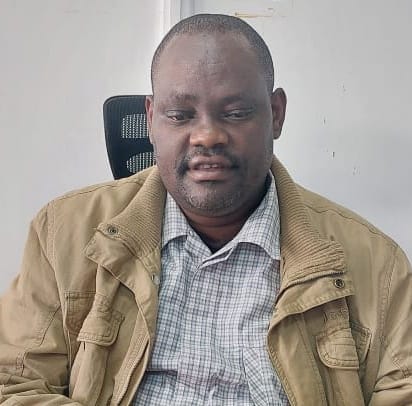
Other people who are benefitting from FGM are circumcisers.
“For each girl she cuts, she is paid Sh1,000 ($8). If she cuts about 20 girls, then she fetches a good amount of money. Many are doing so because they too have been affected by the ravages of the drought and are facing harsh economic times. Even those who had abandoned this trade are secretly returning to it because they too need to feed their families,” Loram says.
Cattle rustling
Pyatich notes that there have been heightened incidents of cattle rustling. This is because karachunas (young Pokot warriors) raid other villages for purposes of topping up their livestock herd. Since a circumcised girl aged 9 – 15 years fetches more dowry, and with cases of child marriage increasing, it is important for the karachunas to engage in as many cattle rustling activities to increase their livestock count.
Landslides
Extreme weather patterns have also seen incidents of landslides in some areas of West Pokot, most notably in 2019 and 2020. These landslides, mostly witnessed in the Nyarkulian, Tapach, Batei, Weiwei, Lomut, Tamkal and Chesegon areas caused massive losses, including destruction of homes, death of livestock and damage to crops. Additionally, the landslides reversed great FGM strides that had been made in the areas.
According to Pyatich, many families had abandoned FGM, with elders having declared the areas anti-FGM zones. However, the landslides changed this.
“The elders thought they were being punished by their ancestors for abandoning FGM. They believed their forefathers were cursing them and since they didn’t want any punishment, they made a declaration that all girls and women be circumcised. Under the orders of the elders –whose word is final –a mass circumcision exercise of girls and women began. Hundreds of schoolgirls, university students, and even career women who had survived the cut were forcibly circumcised. Those who protested were threatened with banishment from the community, so they complied,” Pyatich says.
Breaking the law
Interestingly, most of the community members are aware that FGM is illegal, but it is immaterial to them. They can quote the entire anti-FGM law, but with the prevailing circumstances and the need for survival, the law is a secondary concern. To avoid being caught, they have changed tact about when and where they are cutting girls.
“They are doing so at night in the bushes, caves, riverbanks, border points, and even under the guise of religious meetings. For example, in 2019 in Alale ward, a circumcision activity was conducted under the guise of a ‘church youth camp’ for girls. By the time people got wind of what was going on and informed the local authorities, all girls – totaling 94, had already been circumcised,” says Pyatich.
Pyatich says that over 2,500 girls are at risk undergoing the cut this November – December 2022 school holiday and unless something is urgently done by the government and other stakeholders, they will be circumcised. Once cut, they will be married soon after, ending their educational ambitions.
Assistant Chief Loram says the local authorities are working diligently to prevent girls from being cut.
“We are constantly holding sensitization forums in baraza’s in the community, in churches, and other places where community members congregate. We are going from village to village, using caravans to create as much awareness as possible. We are also working with NGOs such as World Vision who are helping us tackle cross-border FGM activities with our Uganda neighbours. We have previously arrested those going against the law, and this helps deter those who may have a similar motive. However, we cannot overrule the fact that many are now forcing their girls into circumcision secretly. However, we will not relent and have intensified our intelligence efforts to ensure we curb these activities,” says Loram.
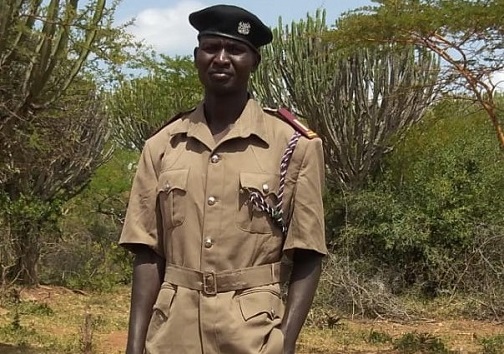
Domtila has also started an informal school in Kotulpogh village that is teaching young girls’ basic arithmetic and reading, as well as providing them with life skills education. The girls who are enrolled in the informal school will likely be integrated into mainstream schools. Domtila continues to lobby the government to build more schools in West Pokot, which will not only increase the literacy levels of girls in the community, but will offer them safe spaces that will help reduce their exposure to harmful traditional practices such as early marriage and FGM.
I-Rep Foundation has also been linking girls and women to various empowerment programmes implemented by different partners in the community, as a way of providing them with alternative sources of livelihood.
Will FGM be eradicated in Kenya by 2022?
Kenya, through former President Uhuru Kenyatta committed to eliminating FGM by the end of 2022. As it stands, this is unlikely to be achieved. This is because the effects of climate change are heightening the vulnerability of girls, leading many families in drought-stricken areas –including those that had reconsidered the practice, to turn to child marriage as a means of survival. Climate change is making an already dire situation worse.
Indeed, policies, programmes and initiatives addressing climate change in the country must also consider the disproportionate effects on girls and women, more so those in communities that depend purely on their environment for their livelihood.
*Name changed to protect her identity as a minor.
Do you have feedback on this article? Please comment down below or email me at maryanne@mummytales.com
Also read: PASHA, a mobile app to help fight FGM in Kuria launched
Also read: The menstruation experiences of women and girls with disability in Kenya
Also read: Why Kenyan teenage mothers do not return to school despite re-entry policy
 Mummy Tales is a platform dedicated to women and girl empowerment. Connect with Mummy Tales on: FACEBOOK l YOU TUBE l INSTAGRAM l TWITTER
Mummy Tales is a platform dedicated to women and girl empowerment. Connect with Mummy Tales on: FACEBOOK l YOU TUBE l INSTAGRAM l TWITTER














